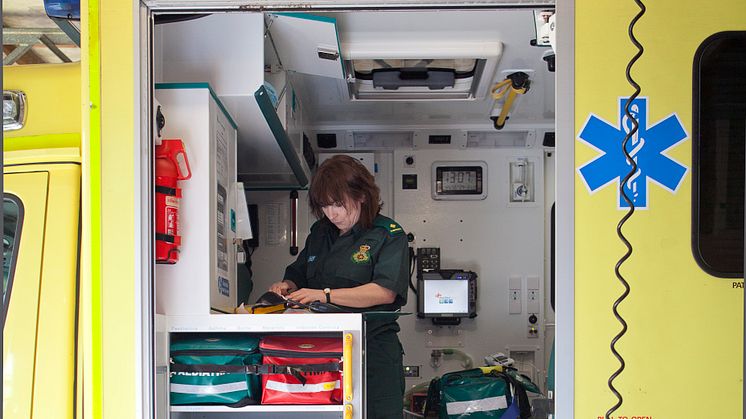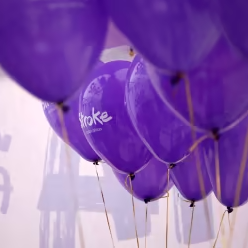
Press release -
Stroke costs are three times higher than previously estimated
New figures from the Stroke Association reveal that the UK’s current annual cost of stroke is £26 billion; (i) a threefold increase from the previous estimated cost of £9 billion(ii). The UK’s leading stroke charity is warning that, without immediate action, this figure is likely to triple to £75 billion by 2035.
Research from 2009 previously estimated that stroke cost UK society around £9 billion a year. However, the Stroke Association’s latest report, Current, future and avoidable costs of stroke, Part 2, suggests that informal costs to families and carers have been significantly underestimated. The figures also predict that a growing and ageing population, increasing numbers of stroke survivors, and rising care costs are crucial factors behind the increasing financial burden of stroke over the next 20 years.
The £26 billion cost of stroke breaks down as:
The latest figures set the cost of stroke on a par with the financial burden of dementia, which costs the UK £26.3 billion each year(iii).
Juliet Bouverie, Chief Executive of the Stroke Association, said: “Researchers now predict that in less than 20 years’ time, stroke could cost our country £75 billion every year. With the number of people living with stroke set to soar, and the cost of the condition spiralling, we need radical changes to the way stroke is prioritised and managed across the UK.
“The majority of the vast financial burden caused by stroke is shouldered by thousands of families and carers, who give up everything, including their jobs, to look after loved ones whose lives are turned upside down in an instant by stroke. Stroke survivors without close family are left isolated, without the long-term support they desperately need. Stroke is the single biggest cause of adult disability in the UK and can leave people at any age unable to walk, speak, read or write.
“We need urgent action to make sure we have the best possible system in place to help stroke survivors and their carers. Firstly, we need a commitment from the Government to publish a new national plan for stroke in England to replace the current stroke strategy which comes to an end in December. This will drive action to help more stroke survivors return to work, live independently, and take control of their lives again, while easing the enormous financial and emotional pressures that far too many family members face.
“Further funding for stroke research is also crucial. It may seem obvious that research is needed to help reduce these costs, but stroke research remains severely under-funded compared to other major health conditions. For every person living with stroke, just £48 a year is spent on medical research compared to £118 for every dementia patient(iv). This simply isn’t acceptable: we must change the story for stroke.”
The study found that if funders began to make a sustained £60 million investment across a number of priority areas of stroke research, this could lead to an overall saving of up to £10 billion by 2035.
Professor Anita Patel, who led the research, said: “It is clear that informal carers make a huge contribution to stroke care, and that social care costs will increase substantially by 2035. There’s no doubt that this will present real societal challenges in future. However, our research findings also show that there is great potential to alleviate some of these costs through increased investment in research.”
The research was undertaken at Queen Mary University of London and London School of Economics, and was sponsored by Legal & General.
Graham Precey, Head of Corporate Responsibility and Ethics at Legal & General said: “Investing to improve the population’s health against the risk of stroke makes economic sense. We are faced with a growing burden of chronic disease that is not sustainable. We need to act now to help reduce the impact of disease and disability to create a healthier world. Research into preventing stroke needs to be prioritised if we want to change the story for stroke.”
The Stroke Association’s Change The Story campaign aims to highlight the underfunding of stroke research and calls on people to donate to towards research funding. For more information about Change the Story and the report Current, future and avoidable costs of stroke in the UK (Part 2), visit www.stroke.org.uk/change
Ends
For interviews with Stroke Association spokespeople and case studies, please contact the Stroke Association’s media team on 020 7566 1500 or email press@stroke.org.uk
For urgent out of hours media enquiries only please call 07799 436 008. ISDN facilities available.
Notes to editors
(i)Current, future and avoidable costs of stroke in the UK (Part 2). Produced by the Centre for Primary Care & Public Health, Queen Mary University of London and the Personal Social Services Research Unit, London School of Economics and Political Science for the Stroke Association. Research carried out by Anita Patel, Vladislav Berdunov, Derek King, Zahidul Quayyum, Raphael Wittenberg, Martin Knapp (August 2017)
(ii)Current, future and avoidable costs of stroke in the UK (Part 2). Produced by the Centre for Primary Care & Public Health, Queen Mary University of London and the Personal Social Services Research Unit, London School of Economics and Political Science for the Stroke Association. Research carried out by Anita Patel, Vladislav Berdunov, Derek King, Zahidul Quayyum, Raphael Wittenberg, Martin Knapp (August 2017)
(iii)Dementia UK: Update, Second Edition, Researched and written by King’s College London and the London School of Economics: Prince, M, Knapp, M, Guerchet, M, McCrone, P, Prina, M, Comas-Herrera, A, Wittenberg, R, Adelaja, B, Hu, B, King, D, Rehill, A and Salimkumar, D,.November 2014 https://www.alzheimers.org.uk/download/downloads/id/2323/dementia_uk_update.pdf
(iv)Stroke Association (2014). Research Spend in the UK: Comparing stroke, cancer, coronary heart disease and dementia. Available: http://www.stroke.org.uk/research-spend-uk. Last accessed 09 January 2015.
Topics
Categories












